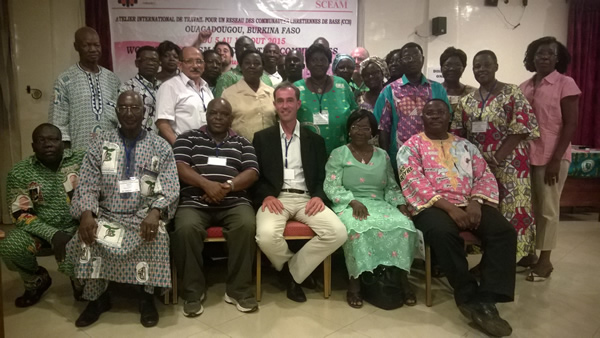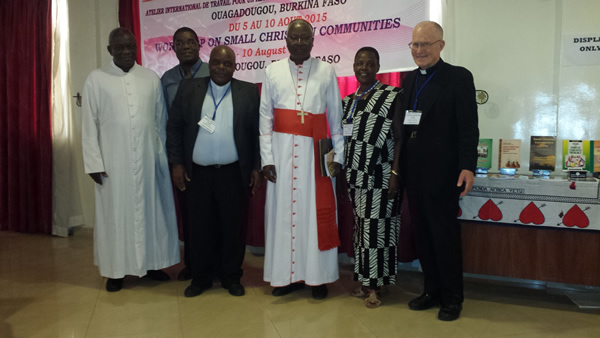Planning Workshop in Burkina Faso Emphasizes Networking among Small Christian Communities


Fourteen delegates from six African countries (Burkina Faso, Democratic Republic of the Congo, Ghana, Kenya, Togo and Zambia) and from Bolivia and Germany participated in a “Planning Workshop on Networking among Small Christian Communities (SCCs)/Base Christian Communities (BCCs) in Africa” in Ouagadougou, Burkina Faso from 6 to 9 August, 2015. They were joined by 15 grassroots representatives of BCCs in the host country. The workshop was organized by the SECAM (Symposium of Episcopal Conferences of Africa and Madagascar) Commission of Evangelisation in association with Missio, Aachen, Germany.
In his “Opening Address” Cardinal Philippe Ouedraogo, the Archbishop of Ouagadougou, emphasized the significance of small Base Christian Communities in Africa in relation to the 2015-2016 worldwide Year of Mercy in the Catholic Church and the continent-wide 2015-2016 African Year of Reconciliation (ATR). He said that African BCCs combine the pastoral experience of the apostolic church in the 1st Century and the values of African culture in the 20th and 21st centuries. BCCs play an important role in the growth of the African Church today and promote the theology and practice of the Church as Family of God. He urged the delegates to find concrete ways that SCCs/BCCs can help family and marriage in Africa, adding that at the Synod of Bishops in Rome in October, 2015 “we African Bishops will have something to say.”
The delegates shared their grassroots pastoral experiences of SCCs/BCCs in the Local Churches in Burkina Faso, Democratic Republic of the Congo, Eastern Africa (the AMECEA Region of Eritrea, Ethiopia, Kenya, Malawi, South Sudan, Sudan, Tanzania, Uganda and Zambia), and Togo as well as Bolivia/Latin America and Missio/Germany. The participants experienced the dynamism and energy of this “New Way of Being/Becoming Church” and this “New Pastoral Model of Church” especially in the Global South. It was reported that the host country Burkina Faso has 15 dioceses, 177 parishes with CCBs and a total of 8,162 CCBs (Communautés Chrétiennes de Base in French). The nine countries of Eastern Africa have over 180,000 SCCs.
The main “Recommendation for the Way Forward” is summarized as follows:
The consultative meeting that was attended by SECAM and Missio delegates recommended the creation of a SECAM-MISSIO Small Christian Communities (SCCs) Networking Team. It is supposed to be a small team whose membership will be those pastoral agents who are actively involved in the promotion of this ecclesial model.
The Networking Team will promote information and sharing of experiences about the importance of SCCs in the Local Churches of Africa, reciprocal theological reflection with the Department of Theology of Missio in Germany and interaction with other continental bodies where SCCs are seen as a new way of being church.
Highlights of the SCCs Workshop included:
Visit to St. Lazarus CCB, one of the 32 CCBs in Our Lady of the Apostles Parish. Combining three zones in the parish this BCC has 100 families and 600 members. About 60-70 members participated in the singing, dancing, drumming, speeches, questions and answers and prayers in French and Moore the local language. There was a good mixture of women and men and quite a few young people. There was a lot of lay participation and the explanation of many lay ecclesial ministries. Given that Burkina Faso is 60% Muslim the ministry of Christian-Muslim Dialog is very important. Matthew 18:21-35 on the theme of “Forgiveness and Reconciliation” was read and reflected upon. BCC members gave practical examples of the challenges of forgiveness in their families and communities. The Prayer Leader emphasized the greatness of God’s mercy and connected the theme to the 2015-2016 Year of Mercy in the Catholic Church. In a joyful spirit of friendship and sharing the visitors were welcomed with a cold local drink made of millet and sugar and roast meat.
Small Christian Communities Mass. To celebrate the continent-wide 2015-2016 African Year of Reconciliation (AYR) the theme was “Reconciliation and Peace” using the Eucharistic Prayer of Reconciliation. Participants danced into the church singing Kweli Kweli ni Baraka Kutoka kwa Mungu (a Swahili song meaning “Yes Indeed These are Blessings Coming from God”). The Exchange of Peace was at the end of the Penitential Rite to show that “the community of believers was of one mind and heart” (Acts 4:32) before listening to the Word of God. The symbol of peace was from Mende Ethnic Group in Sierra Leone and ethnic groups in South Sudan and Sudan: simultaneously putting one’s right hand on the other person’s left shoulder and saying "peace."
Before the readings the Bible was carried into the chapel in a Bible Procession with singing and dancing. Rather than the traditional homily there was a Shared Homily in small groups of two each. To show the rich diversity of the Catholic Church the Our Father was said in different African mother tongues (heart languages) — Bemba (Zambia), Ewe (Ghana, Togo, Benin and Niger), Lingala (DRC), Luyia (Kenya), Moore (Burkina Faso) and Swahili (Eastern and Central Africa) — as well as in English, French, German and Spanish. Then everyone joined hands and prayed a second time in one language, French, to show the unity in the church.
All the participants in the workshop felt support for their involvement in SCCs around the world and expressed both enthusiasm and commitment to march ahead.
